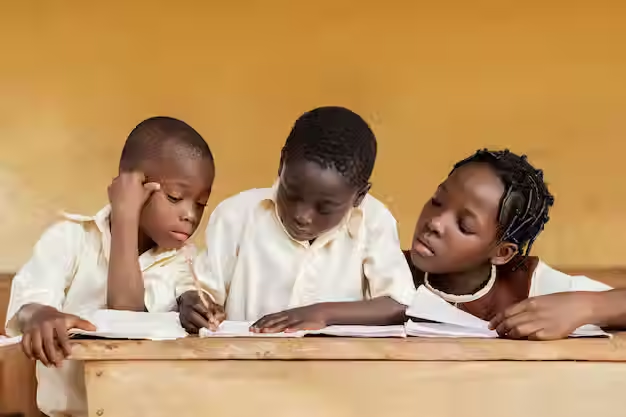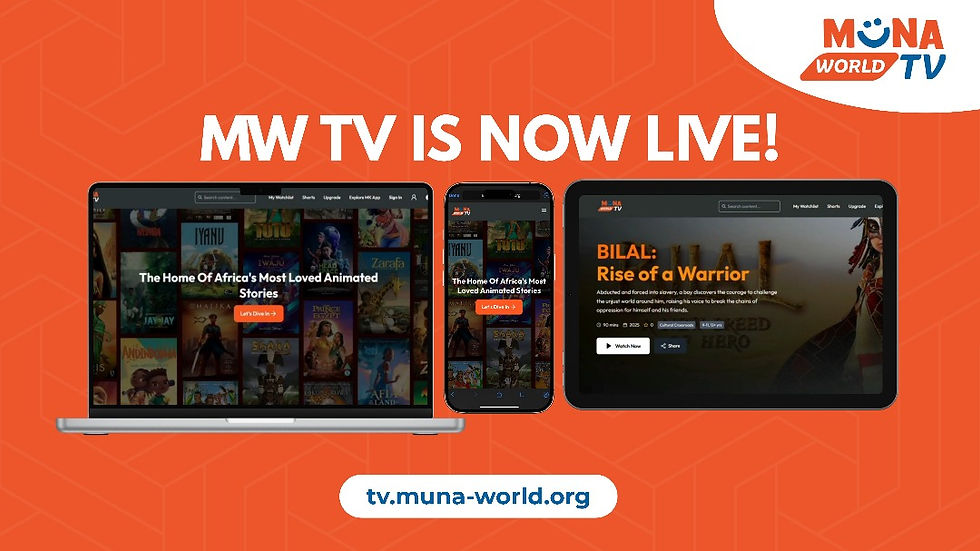A child who reads and writes regularly will most likely be more confident, think faster and express themselves better.
- Muna Kalati

- Feb 15, 2022
- 4 min read
Updated: Feb 12, 2025

Mr. Simpson Muhwezi is the Founder and Creative Director of Wandiika Literacy Initiative, a social enterprise whose mission is to use story-writing to help children develop their critical thinking and problem solving skills; the skills he strongly believes are vital not only for their academic performance but also their survival and prosperity in the 21st Century. He curates the initiative’s flagship programme, Wandiika Children’s Writing Prize, an annual creative writing competition. He is also a writer, of mainly children’s stories.
Could you tell us about your initiative? (Its objectives, target and expected results).
In the long-term, Wandiika seeks to raise a generation of Ugandans with the necessary skills to solve their own problems. We can only achieve this if our children are helped with good learning practices. A child who reads and writes regularly will most likely be more confident, think faster and express themselves better. Once these habits have been established in an individual’s life at an early age, the possibility of having globally competitive citizens in future is greater.
Where did you get the idea to set up such an initiative? (What was your inspiration, why this initiative? Why issue or problem(s) are you trying to solve?)
In my school visits as storyteller and author, I noticed a lot of gaps in Uganda’s education. A typical Ugandan primary school pupil is one who spends most of their school hours in class, taking notes, revising or cramming, without enough time to apply or reflect on the knowledge. I saw the need to disrupt this pattern, and story-writing as a potential complimentary teaching method through which learners could exercise their minds and see things beyond their imagination.
How is it different from similar existing projects? What is its added value?
Participating in Wandiika Children’s Writing Prize is free of charge, which makes it accessible for the economically disadvantaged. Learners write stories in their free time, and are encouraged to discuss with their peers and to seek guidance from their parents and teachers. These student-student, student-teacher and student-parent conversations culminate in lessons about kindness, career aspirations and life. The writing competition does not interfere with with the children’s learning but complements it. It’s a much desired fun break from their often tiring schedules in the classroom.
What progress or achievements have been made to date? (Please talk about your activities and programs.
There has been a shift in attitudes among the teachers and students in the schools we’ve worked with. Most of these have allocated more time on their school calendar to writing and reading. The courage of the students has also been impressive. Seeing primary school pupils in rural Ugandan schools getting their stories published has been quite satisfying.
Collaborez vous avec d’autres entrepreneurs de votre milieu/industrie ? Si oui, comment décrirez vous cette collaboration jusqu’à présent ? | Are you collaborating with other entrepreneurs in your industry? If yes, how would you describe these collaborations?
We have collaborated with a number of organizations and individuals. Some of the organizations are Enjuba, a catalytic children’s education organization and Gustro Book Center, a book distributor and store. These donated sets of storybooks to the winners of the inaugural edition of the competition. We’ve teamed up with the City Authority’s children’s Library, where our awarding ceremonies have been held. Plus several distinguished professionals who have served as illustrators and judges.
What are your current sources of funding? Could you be described as financially self-sufficient? How do you plan to make your initiative more financially self-sufficient in the coming years? *
We have relied on in-kind contributions from individuals and organizations. One such organization is Australian Books for Children of Africa (ABCA). We intend to diversify our funding sources in order to extend the reach of our activities.
What are the main challenges or difficulties you encounter in carrying out your project? How do you overcome them? *
There have been instances where teachers and parents cheat for their learners. We are slowly overcoming this challenge by helping parents and teachers understand the purpose of the programme. There are also cases where schools are reluctant to enroll, often because they are focused on completing their syllabuses. We are solving this by making the competition as flexible and convenient as possible.
How has the COVID-19 impacted your work? What measures did you develop to adapt and build resilience? *
Covid-19 lockdowns led to school closure and, consequently, the 2020 edition of Wandiika Children’s Writing Prize was cancelled. This discouraged the participants who had anticipated the Prize. However, it presented us an opportunity to reflect and design better strategies. Social media is one of the ways we’ve reached our participants in this challenging period.
What support or assistance would you need to increase the impact of your initiative and accelerate its development? *
The support of teachers and parents is vital. I also wish the government could be more deliberate in supporting creative interventions in education.
What is the impact of your initiative on the promotion of reading and culture? Kindly share statistics about your impact. *
In the 2018 and 2019 editions, we managed to give over 3000 pupils from across 13 schools in Central and Northern regions of the country an opportunity to tell their stories. We’ve published a set of stories from the 2019 edition of the competition as a book. This publication has enabled its authors to inspire their peers, not only in their school but also in others. We hope to publish more of these child-authored books, and to subsidize them so disadvantaged schools who often cannot afford good quality storybooks can use them in their classrooms and libraries. This might help in solving the problem of insufficient supply of culturally-authentic children’s books.
What are your plans for the 3 to 10 years? What legacy do you want to leave *
In that timeframe, we will have scaled up the initiative to reach millions of learners annually. I would like to leave a legacy of using literature and art to nurture the next generation of Ugandans to rise above the challenges of their time.
Any last word? Anything else that hasn't been adressed in this form? (Kindly share with us!)
I thank Muna Kalati for the opportunity to share my thoughts.




Comments